Pope Francis


Pope Francis named two new archbishops in Italy on Oct. 27, seen as strategic appointments for the pontiff’s push to create a “poor church.”
Matteo Maria Zuppi will leave his position as an auxiliary bishop of Rome to take up his new post in Bologna, in central Italy. And Corrado Lorefice, a parish priest in the Sicilian city of Noto, has been named archbishop of Palermo.
Both are relatively young to receive such high office; Zuppi turned 60 this month, while Lorefice has just celebrated his 53rd birthday. But more importantly, the new archbishops have adhered to the pontiff’s wish to prioritize caring for the poor.
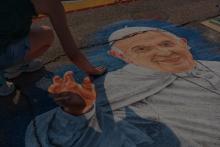
At the conclusion of the most recent synod, Pope Francis encouraged bishops assembled to continue their journey. During this ongoing journey, Pope Francis warned against “hostile inflexibility” and to allow one’s self to “be surprised by God.”
Will seeking an understanding into the differences between civil and sacramental marriage help to diffuse church tension? Can religious and civil liberties peacefully coexist?
The words and actions of Pope Francis certainly indicate a desire to explore such a path. The question then becomes: will others follow him on this journey?
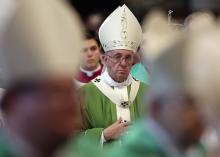
The most significant and contested gathering of Roman Catholic bishops in the last 50 years formally ended on Oct. 25 after three weeks of debate and dispute, but the arguments over who “won” and who “lost” are only beginning.
The synod of 270 cardinals and bishops from around the world was the second in a year called by Pope Francis to address how and whether Catholicism could adapt its teachings to the changing realities of modern family life. Traditionalists had taken a hard line against any openings, especially after last October’s meeting seemed to point toward possible reforms.
While the delegates made hundreds of suggestions on a host of issues, two took center stage, in part because they represented a barometer for the whole question of change: Could the church be more welcoming to gays, and was there a way divorced and remarried Catholics could receive Communion without an annulment?
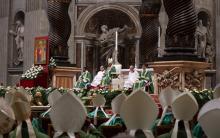
The overriding interest in the global meeting of Roman Catholic bishops that finishes here on Oct. 25 has centered on whether the churchmen will actually do anything in the end — as in vote to make changes in church doctrines or policies — or leave well enough alone.
In reality, the gathering of 270 bishops from around the world, called a synod, has no authority to legislate doctrinal or other changes, and wasn’t expected to try anything that bold anyway.
Its real purpose — thanks to reforms instituted by Pope Francis — is to discuss issues openly and frankly, and to advise the pontiff about what they think the church ought to do about the challenges facing families today, or, as is likely the case for this divided synod, to kick the hard questions upstairs for him to decide.

The eight American bishops taking part in a Vatican summit on family life stay at a huge seminary built high on a hill overlooking St. Peter’s Basilica and the rest of the Eternal City.
It’s a lovely place with spacious apartments for each bishop and any amenity they might need.
But for all that, it may be getting a tad uncomfortable.
In the latest installment of an increasingly sharp exchange conducted via the media, Philadelphia Archbishop Charles Chaput on Oct. 19 rejected what he took as a swipe at him by Washington Cardinal Donald Wuerl, also a member of the U.S. delegation at this gathering of global bishops.

The morning prayer that starts each session of a major gathering of Catholic churchmen underway here is an important chance for the 270 cardinals and bishops from around the world to set a meditative tone for what are contentious debates about church teachings on sexuality and family life.
With Pope Francis leading the way, the prelates seated in a large Vatican lecture hall chant the traditional Latin prayers pausing near the end for a brief reflection on the day’s Scripture by one of the bishops at the meeting, known as a synod.
Yet even that moment of spiritual peace is not always a sanctuary from the tensions roiling the three-week meeting that ends Oct. 25.
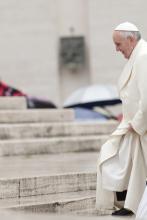
Francis’ visit was said to have delighted around 30 homeless men hosted at the dormitory, who spoke to the pope, recounted their stories and asked to be blessed. The pontiff’s visit lasted around 20 minutes, Vatican Radio reported.
He was accompanied by his almoner (distributor of alms or charity), Archbishop Konrad Krajewski; the Jesuit superior general, the Rev. Adolfo Nicolas; and three nuns who work at the residence.
The “Gift of Mercy” (“Dono di Misericordia”) homeless shelter was inaugurated earlier this month and can host 34 people each night. The building, a former travel agency, was converted by Jesuits as a response to Francis’ call for more to be done to help poor people.

Religious historian Diana Butler Bass is our preeminent narrator of the decline of traditional religion and the emergence of progressive and spiritual-but-not-religious faith in the 21stcentury.

The first thing the new Pope Francis said to the world in St. Peter's Square when he accepted the papacy was "I am a sinner." In a final mass of one million people in Philadelphia, the last words Francis spoke to the American people were, "Please pray for me; don't forget!"

WASHINGTON, Sept. 29, 2015 -- Pope Francis' visit to the U.S. sparked inspiration and action among hundreds of Christian, Muslim, Jewish and other national religious leaders at the 2-day interfaith Coming Together in Faith on Climate gathering September 24 and 25 at Washington National Cathedral. The events celebrated the Pope's leadership on climate change, and top leaders pledged to make an impact in their houses of worship and inspire their congregations and communities to care for creation.

Even as Pope Francis and Catholic leaders from around the world debate ways to make the Catholic Church more inclusive, Newark Archbishop John Myers has given his priests strict guidelines on refusing Communion to Catholics who, for example, support gay marriage or whose own marriage is not valid in the eyes of the church.
In the two-page memo, Myers also orders parishes and Catholic institutions not to host people or organizations that disagree with church teachings.
He says Catholics, “especially ministers and others who represent the Church, should not participate in or be present at religious events or events intended to endorse or support those who reject or ignore Church teaching and Canon Law.”
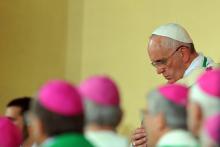
Pope Francis on Oct. 14 asked forgiveness for a series of scandals that have befallen the Vatican and Rome.
Francis did not specify the scandalous events to which he was referring, although the departure of a gay cleric earlier this month may well have been on the pontiff’s mind.
“I ask you for forgiveness for the scandals that have occurred recently either in Rome or in the Vatican,” the pope said during his weekly general audience in St. Peter’s Square.

Rev. Jim Wallis leads the Christian social justice group Sojourners. He is known for merging faith with public life, urging candidates for office to discuss moral issues in a way that transcends ideological divisions. Michel Martin talks with Wallis about his book America's Original Sin: Racism, White Privilege and the Bridge to a New America.
MICHEL MARTIN, HOST:

Pope Francis’ first U.S. visit gave his already-high favorability ratings only a modest bounce with most Americans — and no bounce at all among Catholics.
Yet his three-city September tour — from Congress to the United Nations and from cathedrals to a prison — generated significant goodwill toward the Catholic Church, according to a new survey by the Pew Research Center.
Pew’s survey, conducted just days after the pope returned to Rome, was released Oct. 7 and offers a snapshot of his initial impact.
The top finding: “Four times as many U.S. adults say their opinion of the Catholic Church is better now because of Pope Francis as people who say their impression has gotten worse,” said Greg Smith, associate director of research and co-author of the report.
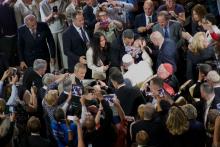
“We do not remember days,” the Italian poet Cesare Pavese said, “we remember moments.”
Pavese’s words have come to mind often as I’ve thought about Pope Francis’ historic visit to the United States, particularly when people have asked me what the “best part” of covering the papal visit was for me.
My answer is always the same: hands down the best part was watching people see (and sometimes meet) Pope Francis in person for the first time.

The Vatican’s high-level meeting on the family continued Oct. 6, with bishops emphasizing the need for open discussion on divorced and remarried Catholics.
The 62 bishops who have so far spoken at the gathering, called a synod, appeared to push back strongly against remarks Monday by Hungary’s Cardinal Peter Erdo, who defended the church’s exclusion of divorced and remarried couples from receiving Communion unless they’ve been granted an annulment and remarried in the church.
Speaking to journalists on Tuesday, Archbishop Claudio Maria Celli, president of the Pontifical Council for Social Communications, said there would be an open discussion on the topic.
“The synod has a wide vision … of the universal church,” Celli said.

The Vatican announced Oct. 6 that Pope Francis would visit Mexico in 2016, reports the Huffington Post.
It has also been confirmed that on the trip, he will go to the shrine of Our Lady of Guadalupe. In addition, he is expected to go to a location at the border with the U.S. where immigrants without papers try to make the perilous journey north.

FOR IMMEDIATE RELEASE &

This short documentary profiles 100 women who marched 100 miles to Washington, D.C., to call for comprehensive immigration reform. Inspired by the message of Pope Francis, these women believe immigration is a women's issue.
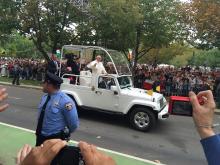
Pope Francis’ visit to the United States last week was a huge hit with the media and with the public. This week, Americans may have wondered whether he would provide ongoing unity and inspiration for our public discourse, or whether we would return to culture warring and ideological sniping.
Liberals inside and outside the Catholic Church noted that the pope made only brief allusions to abortion and same-sex marriage but spoke at length about immigration, climate change, and economic inequality.
Yet as progressives were ebullient, news broke Sept. 29 that Pope Francis met privately with Kim Davis, the Kentucky county clerk who refuses to sign marriage licenses for same-sex couples.